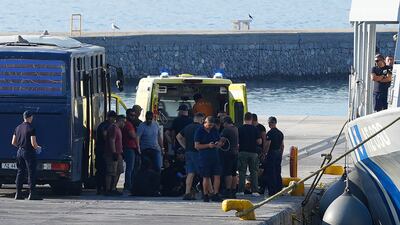About 150 migrants were rescued from overloaded sailboats provided by smugglers in two separate incidents on Wednesday off Greece.
In the first case, 76 people was rescued from a yacht in distress 118km south-west of the Ionian Sea island of Zakynthos in western Greece, a coastguard statement said.
In the second incident, about 80 people were safely removed from a sailboat off Kythnos island, one of the Cyclades to the south-east of Athens.
The central Mediterranean crossing route from North Africa to Europe is the world's deadliest.
An added danger this summer is that traffickers are using “iron boats, which cost less than the usual wooden ones but are utterly unseaworthy”, the International Organisation for Migration has warned.
In the first rescue, the migrants were all taken on to a passing Egyptian-flagged cargo ship and there were no reports of anyone missing.
In the second, everyone was in good health and they were taken to the port of Kythnos.
In two more incidents, the Greek coastguard picked up 29 migrants from boats off islands near Turkey in the eastern Aegean Sea.
On Tuesday, another 90 people were rescued in four incidents in the eastern Aegean.
Greece has seen an increase in the arrival of smuggling boats bringing migrants into the country over the past two months, mainly in small dinghies heading to eastern Aegean Islands from the nearby Turkish coast.
At least 2,013 people have died or gone missing so far this year trying to cross the central Mediterranean, according to the UN migration agency – a huge increase on the figure for the whole of 2022, which was 1,417.
In June, one boat sank in the western Mediterranean, killing at least 82 people in one of the deadliest incidents involving migrants in the area.
More than 17,300 people have reached Greece by land and sea so far this year, according to latest UN figures. About 13,500 of them arrived by sea.
After nearly a million people entered Greece at the height of Europe’s 2015 migration crisis, the vast majority hoping to move north to wealthier European countries, Athens increased patrols along its sea and land border with Turkey to halt arrivals.


